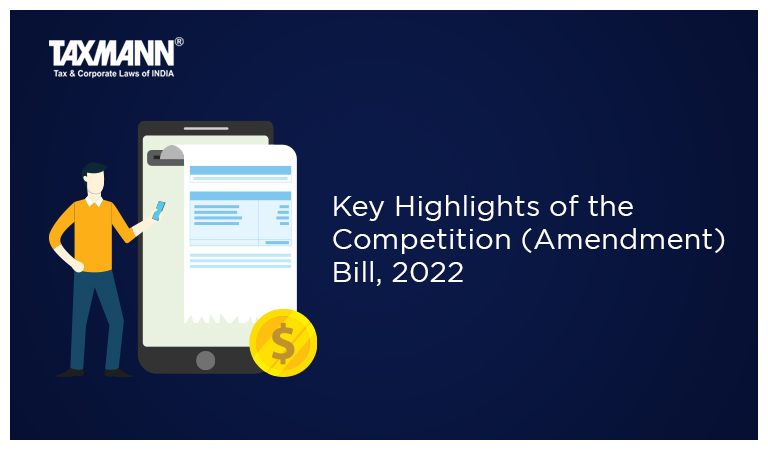Key Highlights of the Competition (Amendment) Bill, 2022
- News|Blog|Competition Law|
- 2 Min Read
- By Taxmann
- |
- Last Updated on 8 August, 2022

The Competition (Amendment) Bill, 2022 was introduced in Lok Sabha on August 5, 2022. The Bill seeks to amend the Competition Act, 2002. The key amendment includes a) Expansion of scope of the combinations to include transactions with a value above Rs. 2000 crores b) Reduction in the time period for approval of combinations from 210 days to 150 days c) Modification in the definition of control for the purpose of classification of combination d) Expansion of the scope of Anti-competitive agreements e) Provision w.r.t Settlement and Commitment in anti-competitive proceedings. The key highlights of the Bill are discussed in detail as under:
1. Expansion of scope of the combinations to include transactions with a value above Rs. 2000 crores {Section 5]
Section 5 of the Act explains circumstances under which acquisition, merger or amalgamation of enterprises would be taken as combination of enterprises. Bill seeks to amend section 5 of the Act to insert new clauses (d) and (e) to provide that if the value of any transaction in connection with acquisition of any control, shares, voting rights, etc., exceeds Rs. 2,000 crore, it would require filing a notice of combination before the Commission and to empower the Central Government to exempt certain transactions from the requirement to file combination notice under the Act. It further provides to substitute the Explanation to define the terms of turnover, value of transaction, etc.
2. Reduction in the time period for approval of combinations from 210 days to 150 days [Section 6]
As per extant norms, any combination shall not come into effect until the CCI has passed an order or 210 days have passed from the day when an application for approval was filed, whichever is earlier.
Now, the Bill has proposed to reduce the time limit from 210 days to 150 days. Thus, any combination shall not come into effect until the CCI has passed an order or 150 days have passed from the day when an application for approval was filed, whichever is earlier.
3. Modification in the definition of ‘control’ for the purpose of classification of combination [Section 5]
As per section 5 of the Competition Act, 2002, for the purpose of classification of combinations, the term “control” includes controlling the affairs or management by –
(a) one or more enterprises, either jointly or singly, over another enterprise or group;
(b) one or more groups, either jointly or singly, over another group or enterprise;
Now, the bill has proposed to modify the definition of control. Thus, for the purpose of classification of combinations, the term “control” means the ability to exercise material influence over the management or affairs or strategic commercial decisions by one or more enterprises or one or more groups over another group or enterprise.
Disclaimer: The content/information published on the website is only for general information of the user and shall not be construed as legal advice. While the Taxmann has exercised reasonable efforts to ensure the veracity of information/content published, Taxmann shall be under no liability in any manner whatsoever for incorrect information, if any.

Taxmann Publications has a dedicated in-house Research & Editorial Team. This team consists of a team of Chartered Accountants, Company Secretaries, and Lawyers. This team works under the guidance and supervision of editor-in-chief Mr Rakesh Bhargava.
The Research and Editorial Team is responsible for developing reliable and accurate content for the readers. The team follows the six-sigma approach to achieve the benchmark of zero error in its publications and research platforms. The team ensures that the following publication guidelines are thoroughly followed while developing the content:
- The statutory material is obtained only from the authorized and reliable sources
- All the latest developments in the judicial and legislative fields are covered
- Prepare the analytical write-ups on current, controversial, and important issues to help the readers to understand the concept and its implications
- Every content published by Taxmann is complete, accurate and lucid
- All evidence-based statements are supported with proper reference to Section, Circular No., Notification No. or citations
- The golden rules of grammar, style and consistency are thoroughly followed
- Font and size that’s easy to read and remain consistent across all imprint and digital publications are applied



 CA | CS | CMA
CA | CS | CMA
